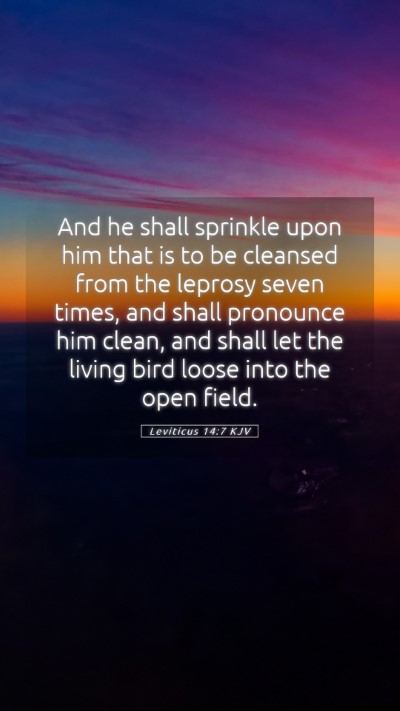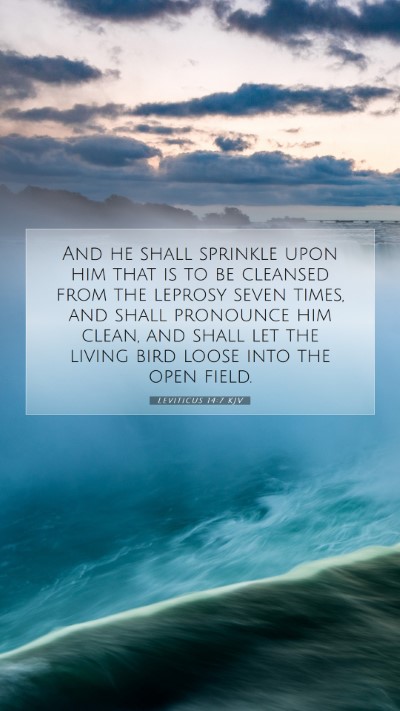Understanding Leviticus 14:7 - Bible Verse Meaning and Interpretation
Leviticus 14:7 states:
“And he shall sprinkle upon him that is to be cleansed from the leprosy seven times, and shall pronounce him clean, and shall let the living bird loose into the open field.”
Overview of the Verse
This verse is part of a broader context that addresses the cleansing of a person who has been afflicted with leprosy, which was a significant concern in ancient Israel. Leprosy was viewed not only as a physical ailment but also had profound social and spiritual implications. In this purification ritual, the act of sprinkling symbolizes the restoration of the individual to the community and the transition from ritual impurity to purity.
Commentary Insights
-
Matthew Henry's Commentary:
Matthew Henry explains that this sprinkling denotes the person's acceptance by God, indicating their return to the covenant community. The repeated action of seven times emphasizes completeness in God's work of healing and restoration.
-
Albert Barnes' Notes:
Barnes highlights the significance of the two birds in this ritual: one representing the life that has been restored and the other symbolizing the sacrifice made. The living bird, released into the open field, signals freedom from illness and the return to well-being.
-
Adam Clarke's Commentary:
Clarke elaborates on the symbolic meaning of the birds, suggesting they represent the dual aspects of atonement — life and death. The ritual reflects the broader themes of sin and redemption, aligning with the biblical principle of substitutionary atonement.
Thematic Elements
The central themes of this verse encompass:
- Restoration: The act of cleansing the leper indicates a restoration not just of health but of social standing.
- Purity: The requirement of a specific number of sprinkles (seven) underscores the requirement for purity in the sight of God.
- Symbolism of Sacrifice: The ritual involves sacrificial elements, which foreshadow the ultimate sacrifice of Christ for humanity.
Application of the Verse
Understanding Leviticus 14:7 invites us to reflect on God's comprehensive care for our well-being, both physical and spiritual. In our modern lives, students of Scripture can consider how the principles of restoration, purification, and sacrifice apply today.
- Spiritual Cleansing: Just as the leper underwent a physical cleansing, believers today seek spiritual purification through Christ.
- Community Acceptance: The act of being pronounced clean signifies the importance of belonging to a community of faith.
- Lessons on Healing: The various aspects of healing in this verse remind us of our need for God's grace in all areas of life.
Cross References
- Numbers 19:18: Discusses the purification process through water sprinkled for cleansing purposes.
- Hebrews 9:19-22: Relates the significance of blood in the atonement and purification rituals.
- Matthew 8:2-4: Jesus' healing of a leper emphasizes the New Testament fulfillment of purity and restoration.
Conclusion
Leviticus 14:7 presents a rich tapestry of meaning regarding healing, restoration, and purity. Through the insights gained from biblical commentaries, readers are encouraged to engage in Bible study groups or online Bible study resources to further explore these vital themes. The ritualistic practices outlined provide significant lessons on how to interpret Bible verses effectively and apply their meanings to contemporary life.
As we delve into scripture analysis and biblical exegesis, let us embrace the fullness of understanding Scripture through the lens of both the Old Testament and the New Testament.


